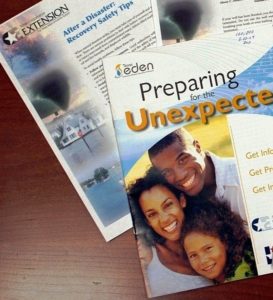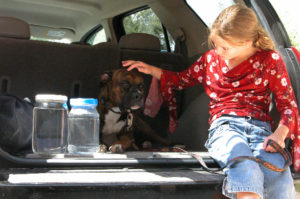AgriLife Extension reminding Texans to be prepared during hurricane season
COLLEGE STATION – With heavy rains, strong winds and flooding expected along the Texas Gulf Coast, the Texas A&M AgriLife Extension Service is urging Texans to make emergency and disaster preparations for themselves and their families this hurricane season.
“It’s vital that Texans, especially those in coastal areas, take the time to prepare for the possibility of flooding, high winds and hurricanes this time of year,” said Dr. Monty Dozier, AgriLife Extension special assistant, College Station. “Hurricane season in the Atlantic and the Caribbean begins around June and typically continues through November.”

Dozier said Texans can begin to prepare for a hurricane by following the advice provided in disaster and emergency preparedness publications available through the Texas Extension Disaster Education Network website, Texas EDEN, at http://texashelp.tamu.edu. Additional information on disaster preparation is available through the Texas A&M AgriLife Extension Bookstore at https://agrilifelearn.tamu.edu/s/.
There are also e-book format downloads available for mobile devices.
Dozier said a few of the most immediate steps a family can take would be to prepare and practice a family emergency plan along with preparing “disaster kits” for the home, office and vehicle.
“These kits should contain enough supplies to last a family at least three days,” he said. “They should be ready to go in the event inclement weather leads to the necessary evacuation of coastal areas.”
Dozier said kit contents should include bottled water, non-perishable foods, a hand-operated can opener, mouth/nose protection masks, extra clothing, a first-aid kit, gloves, blankets, toiletries, battery- or hand-powered flashlight, weather radio, spare batteries, garbage bags, medications and anti-bacterial cleaners or wipes.
He said if there are also family pets needing to be evacuated, a pet emergency kit should also be a part of disaster readiness.
“Some of the items you need to collect for this kit would include the pet’s veterinary records and medications, a towel or blanket and at least three day’s food and bottled water for each pet. Also bring a hand-held can opener and first-aid kit. If you have cats, bring litter and a litter pan. And be sure to take a pet carrier, leash or harness in the event your pet suddenly panics and tries to run away.”
He also suggested pet owners try to locate any pet boarding facilities in their area or along their proposed evacuation route in the event pets need to be relocated for a longer period of time.

“Most kennels, vets and animal shelters will want to see your pet’s vaccination and medical records, which is why it’s important to include these in your pet emergency kit,” he said. “If this isn’t an option, identify family or friends outside of your immediate area who would be willing to host your pets in an emergency. Also identify neighbors, friends or relatives who can evacuate your pets if you are unable to do so.”
It’s also a good idea to prepare a grab-and-go box containing important documents and financial records in the event of an emergency situation, Dozier said.
The AgriLife Extension publication “Personal and Family Financial Records Inventory,” available on the AgriLife Bookstore website, provides guidance on how to consolidate personal and family financial information.
“There are many steps people can take to get ready for a disaster or emergency, and our AgriLife Extension publications offer some practical and useful guidance on how to prepare,” Dozier said. “We hope Texans will use this time to prepare themselves and their families for a possible emergency.”
Paul Schattenberg, 210-859-5752, [email protected]
Contact: Dr. Monty Dozier, 979-458-9271, [email protected]


